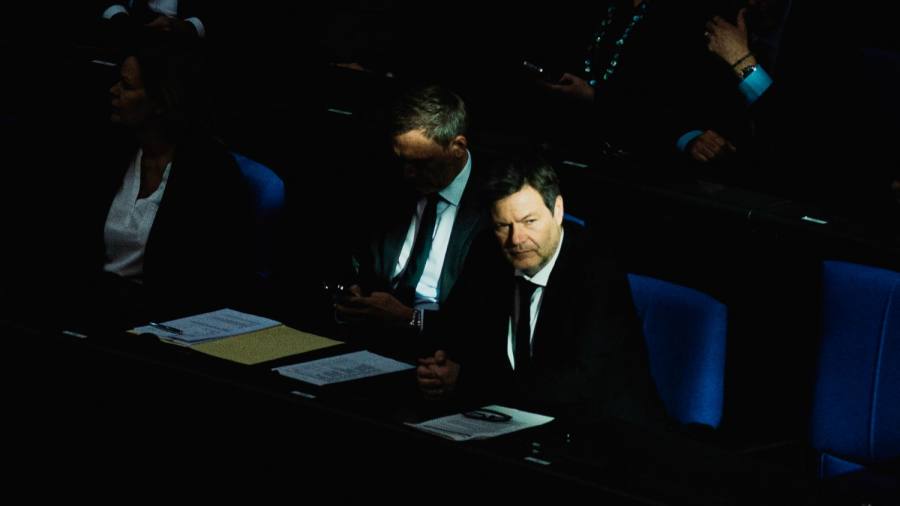Cronyism, boiler bans, botched gas levies — after a whirlwind rise through the ranks of German politics, Robert Habeck is now suffering one of its most precipitous falls.
The Green economy minister and vice-chancellor faced the darkest day in his 17 months in office on Wednesday when he was forced to sack one of his closest aides over a widening nepotism scandal.
The firing of Patrick Graichen, secretary of state at the economy ministry, came with Habeck already on the ropes over an unpopular law to ban new oil and gas heating systems from 2024. Consumer groups have criticised the deadline as too tight compared to countries such as the UK and the Netherlands and worry about the financial burden it imposes on homeowners.
“Herr Habeck is a man of beautiful words, but people are beginning to see through that,” said Julia Klöckner, economy spokeswoman for the opposition Christian Democrats (CDU). “At the end of the day he’s also a minister who has to show leadership.”
The Graichen affair, coupled with the boiler law, have taken the shine off a Green politician who was long viewed as a potential chancellor. In a matter of months he has gone from being Germany’s most popular minister to its most embattled. One poll released this month by Deutschlandtrend said only 30 per cent of voters were satisfied with the job he’s doing.
Manfred Güllner, head of the pollster Forsa, said he doubted Habeck could recover from his latest setbacks. “When you fall so far in the polls, and you’re still heading downwards, it’s very hard to rise up again,” he said.
Meanwhile, evidence is building that Habeck’s travails are also hurting his party. In weekend elections in the city state of Bremen, the Greens saw their share of the vote sink to 12 per cent — the lowest level since 1999.
Friedrich Merz, the CDU leader, said the Greens’ poor showing in Bremen was down to the “Habeck effect”. “I can only urgently advise the coalition not to enact climate policy with a crowbar,” he said. “It’s not working.”
National polling data is also not looking good for the Greens. A poll by Forsa on Wednesday put the party on 15 per cent — one point behind the far-right Alternative for Germany.
Senior Greens are unfazed. “Habeck has said you can’t do politics on the basis of approval ratings, and I agree with him,” said Konstantin von Notz, a prominent Green MP. “He knows that when you’re trying to fight the climate crisis by changing heating systems, you sometimes have to do things that won’t exactly win people’s hearts at once.”
The decline in Habeck’s popularity stands in stark contrast with the adulation he enjoyed for many years. When he and Annalena Baerbock were elected co-heads of the Green party in 2018, the former children’s book author was widely admired for his modern style of leadership, oratorical skills and ideological pragmatism — a characteristic not normally associated with the Greens.
In 2021 the two led his party to their best national result ever when they garnered 14.8 per cent in the Bundestag election. Soon after, he and Baerbock led the Greens into a unique three-way coalition with Olaf Scholz’s Social Democrats and the liberals.
Just months into office, Habeck had to deal with the energy crisis caused by Russia’s invasion of Ukraine and its subsequent suspension of gas supplies to Europe. Habeck and Graichen were widely credited with ensuring Germany did not run out of gas, avoided blackouts and dodged an economic crisis.
But there were plenty of slips on the way. Habeck was lambasted for his plan to impose a gas levy on all fuel consumers, a measure designed to help gas importers such as Uniper that had been driven to ruin by Moscow’s gas shut-off. After an outcry he pulled the plug on it.
The gas levy triggered doubts about Habeck’s economic competence, said Uwe Jun, a political scientist at the University of Trier, while the Graichen affair “has called into question his leadership qualities”.
One of the architects of Germany’s planned transition to a carbon neutral economy, Graichen came under attack last month over his role in the selection process for the new head of Dena, the German energy agency. He had failed to disclose that Michael Schäfer, who was chosen for the job in March, was a close friend and best man at his wedding.
Habeck defended Graichen publicly, saying he had acknowledged his mistake. But worse was to come: on Wednesday the minister revealed that Graichen had approved an application for funding from a Berlin environmental organisation where his sister worked. Habeck said that was “one mistake too many”.
The affair has reflected badly on the Greens, said Klöckner. “They’re shocked that they’re now perceived as a normal party, like any other,” she said. “They’re saints no more.”
But Von Notz dismissed the idea that Habeck had been damaged by the Graichen affair. “If you look at how other parties have dealt with issues like this in the past — they barely draw any consequences at all,” he said.
The Graichen scandal might be quickly forgotten, but not so Habeck’s boiler law, a measure that has triggered alarm in large swaths of the population and turned the minister into a hate figure for some homeowners.
“A lot of people were puzzled that Habeck, the great communicator, seemed unable to properly explain what he was trying to do,” said Jun. “The result of all this is that the public has become pretty disenchanted with him, and relatively fast.”
Read the full article here




